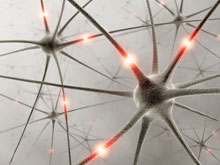Why does MND affect each individual differently?
MND affects each individual differently, it can develop at different speeds, it can affect different parts of the body and it has a different affect on people’s minds, some get depression, memory loss or have problems with decision making. The disease starts very slowly, the patient feels tired and starts to become weak and clumsy. Further into the disease pain starts to arrive in the form of:
 |
- muscle cramps, spasms
- twitching, stiffness
- breathing problems
As the disease progresses the patient develops a number of problems, such as:
- Muscle weakness in the arms, legs and hands
- Throat muscles weaken
- Laugh or cry unexpectedly and uncontrollably, mood swings
- Pneumonia
The difference with each person is usually how it effects different parts of the body. Usually your senses: taste, smell, touch, sight and hearing are untouched; eye and heart muscles are left alone as well as the bladder and bowel control and sexual organs. The muscles in these areas are still intact. The reason for this is unknown however there are cases in which some patients lose control of muscles in those areas.
Why does the disease only attack the motor neuron system when there are other systems connected to it?
The motor neuron system starts in the brain and goes all the way down the spinal cord; from the spinal cord nerves stretch out connecting to all parts of the body. The nerves connected to muscles are called axons and the motor neurons send electric pulses through these axons to the muscles allowing movement. These axons are usually very long, in an adult an axon to the foot is a meter long. The question is, if the nerves are connecting the motor neuron system to other parts of the body why doesn’t the rest of the body get infected with the disease? Scientists believe that this is due to the fact that the motor neuron system is so big and the nerves or axons are very long and it uses so much energy to send the signals through the nerves and get protein and nutrients to help the cells grow. The motor neuron system doesn't have enough energy to continue sending signals to the rest of the body from the motor neurons and so focuses only on its own cells and nourishing them.
.jpg)
